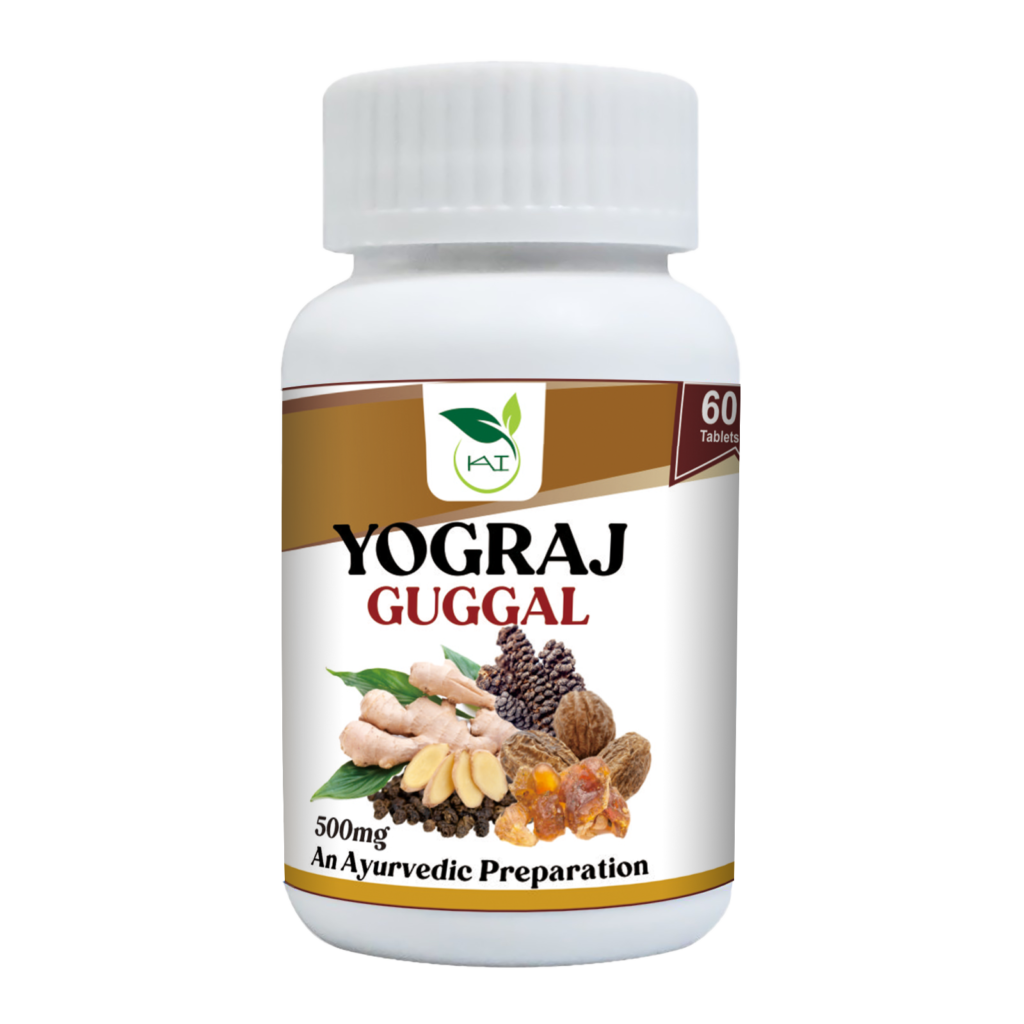YOGRAJ GUGGAL TABLET
PROPERTIES AND BENEFITS OF YOGRAJ GUGGAL TABLET :
Yograj Guggul–Yograj Guggul is an Ayurvedic herbal formulation that consists of a blend of several herbs and minerals. It has been used in Ayurvedic medicine for centuries and is primarily known for its anti-inflammatory and analgesic properties. Yograj Guggul is traditionally used to address various musculoskeletal conditions, including joint pain, arthritis, and inflammation. It is believed to help reduce pain and stiffness, improve joint mobility, and support overall joint health.
Yograj Guggul is typically taken orally in the form of tablets or capsules and is used under the guidance of an Ayurvedic practitioner. It is important to consult with a qualified healthcare professional or Ayurvedic expert before using Yograj Guggul or any other herbal supplement, especially if you have underlying health conditions or are taking other medications.
PROPERTIES OF INGREDIENTS :
Active Ingredients: Each Tablet contains:
Sr. No. | Name of Ingredient | Latin / English Name | Qty in mg |
1 | Chitraka | Plumbago zeylanica | 50 |
2 | Pippalimool | Piper Longum | 10 |
3 | Ajmod | Apium graveolens | 25 |
4 | Guggul | Commiphora wightii | 100 |
5 | Sendha namak | Rock salt | 15 |
6 | Triphala | —- | 20 |
7 | Karavi | Piper chaba | 20 |
8 | Jeera | Cuminum cyminum | 20 |
9 | Devdaru | Cedrus Deodara | 25 |
10 | Twak | Cinnamomum verum | 25 |
11 | Trikatu | —- | 25 |
12 | Gokhshura | Tribulus terrestris | 25 |
13 | Chavya | Piper retrofractum | 15 |
14 | Pluchea lanceolata | 50 | |
15 | Ela | Elettaria cardamomum | 50 |
16 | Musta | Cyperus rotundus | 25 |
17 | Excipient | —- | QS |
- Chitraka: Chitraka, also known as Plumbago zeylanica, is used in Ayurveda for digestive support. It may help improve appetite, aid in digestion, and alleviate gastrointestinal issues.
- Pippalimool: Pippalimool, or Piper longum (Long Pepper) root, is valued for its digestive properties. It may promote digestion, reduce bloating, and support respiratory health.
- Ajmod (Ajwain): Ajmod, also known as Ajwain or Carom seeds, is commonly used to relieve digestive discomfort, including gas and indigestion. It may additionally showcase mild antimicrobial properties and effects to cure gastrointestinal problems and promote healthy intestine it also regularise bowel functions and keep it healthy always.
- Guggul: Guggul is a resin from the Commiphora mukul tree and is known for its potential cholesterol-lowering and anti-inflammatory effects. It is used in Ayurvedic medicine to support joint health and metabolism.
- Sendha namak (Rock Salt): Sendha namak is a type of salt used in Ayurveda. It may help in maintaining electrolyte balance and is often preferred in Ayurvedic cooking.
- Triphala: It is known for its digestive benefits, antioxidant properties, and support for healthy bowel movements.
- Karavi (Caraway seeds): Karavi, or Caraway seeds, can aid in digestion, reduce flatulence, and may have mild antimicrobial properties.
- Jeera (Cumin seeds): Jeera, or Cumin seeds, are used to enhance digestion, relieve gas, and add flavor to dishes. They may also have antioxidant properties.
- Devdaru (Himalayan Cedar): Devdaru is used in Ayurveda for its potential anti-inflammatory and analgesic properties. It could help relieve joint pain , soothe inflammation and manage certain skin problems and cure wrinkles, acne, any kind of infections and prevent dry skin issue.it act as antioxidant for skin
- Twak (Cinnamon): Twak, or Cinnamon, is known for its sweet and warming flavor. It may have antioxidant properties and can be used to support digestive health.
- Trikatu: Trikatu is a blend of three spices: Ginger, Black Pepper, and Long Pepper. It is often used to enhance digestion, stimulate appetite, and support respiratory health.
- Gokhshura (Tribulus terrestris): Gokhshura is known for its potential aphrodisiac and diuretic effects. It is used in Ayurveda to support reproductive health and urinary function.
- Chavya: Chavya is an herb used in Ayurvedic formulations for its digestive and carminative properties.
- Rasna: Rasna is valued for its anti-inflammatory properties and is used in Ayurvedic medicine to support joint health and reduce pain and inflammation.
- Ela (Cardamom): Ela, or Cardamom, is used to enhance digestion, freshen breath, and add flavor to dishes. It may also have antioxidant properties.
- Musta (Nutgrass): Musta is known for its digestive benefits and may help in reducing inflammation and supporting liver health.
- Excipient: An excipient is an inert substance used as a filler or binder in medications and supplements to help with their formulation. It does not provide specific health benefits but is essential for creating the final product.
DOSAGE:
1 to 2 tablets twice a day with milk, honey or as directed by healthcare professional.

